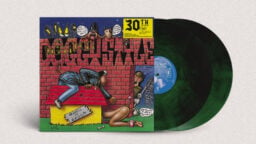Larry Jackson founded his music company gamma just a few months ago, and according to the exec, it’s already clocking 5 billion streams per month across all platforms.
Jackson revealed this stat at the Milken Institute 2023 Global Conference in Los Angeles on Wednesday (May 3), on a panel with Snoop Dogg and hosted by Variety Executive Editor, Shirley Halperin.
Gamma, which has more than $1 billion in capital and debt, counts investors such as private investment firm Eldridge, run by Todd Boehly, and Jackson’s former employer, Apple.
Jackson’s appearance at the Milken Institute 2023 Global Conference coincided with the news that the company is expanding its operations into Africa and the Middle East.
As MBW revealed yesterday, music industry veteran Sipho Dlamini, who has joined the company as President, Africa & Middle East, is leading gamma’s expansion alongside international supermodel and UN Commonwealth Ambassador, Naomi Campbell.
In an expansion of her role as a key advisor to gamma, Campbell is now named as the firm’s Special Advisor, Africa & Middle East.
Amongst the stats and gamma plans revealed by Jackson during the conversation yesterday is that his company has invested in a vinyl manufacturer in Eastern Europe, as part of a plan to revolutionize how the format is distributed in the music industry.
As one of its first vinyl projects, gamma is releasing a limited-edition run of Snoop Dogg’s 1993 hit album Doggystyle, as part of celebrations of the album’s 30th anniversary this year.
The run of 420 vinyl copies – a nod to April 20, the “stoner international holiday,” as Halperin put it – will be in the hands of fans within weeks, something Jackson says the major music companies can’t do.
“Right now we’re hearing from a lot of sources that the major labels are saying to artists, ‘From the time you hand in a test pressing to the time we get it into people’s hands, five to six months. We dropped that on [April 20], guess when they’re gonna have it. June 1,” Jackson said.
“We’ve actually found a way, from a distribution perspective, a manufacturing perspective, to shorten that window dramatically.”
Larry Jackson and Snoop Dogg had a lot of other things to say. MBW listened in on the conversation. Here are five other things we learned:
1. Gamma is on track for 80% YoY growth on some streaming platforms
“As a distribution company, right now we’re doing about 5 billion streams … a month,” Jackson said.
“We actually had our best month ever at Spotify and Apple for April for the third consecutive month. The company is growing [at a pace of] 80% YoY at certain DSPs, the fastest growing distribution service in the world.”
That’s likely due to the impressive roster gamma has built – not just the entire Death Row catalog, but also artists like Rick Ross, Usher and producer L.A. Reid.
To make gamma’s distribution ambitions a reality, the company bought Vydia, the audio and video distribution and services platform founded by Roy LaManna.
2. Gamma’s system for paying artists is ‘revolutionary’
Just as Jackson claims that gamma can put vinyl in the hands of consumers faster than other music companies, he also says that it can pay artists faster – something that he described as “revolutionary.”
“The difference of what we have to offer… is actually with the distribution company that we bought, Vydia, which is becoming Gamma Distribution. If Snoop went to one of the [big three music companies], he’d be getting paid on a bi-annual basis,” Jackson said.
“Paying artists once a month – and in certain cases we can get it down to once a week – is something that we have never seen in the music business in the modern era.”
Larry Jackson
“But now we actually have the ability [through the] analytics dashboard to pay Snoop once a month. There are certain artists that are coming through our distribution company that are being paid once a week.
“You’ve got to understand how revolutionary this is. This doesn’t exist in the music business. This is why I fought so hard to buy a company like Vydia, because of the tech stack that they have that makes it almost like an enterprise software company.”
Jackson added: “In that regard, I’m so proud of that, that I really have to underscore that paying artists once a month – and in certain cases we can get it down to once a week – is something that we have never seen in the music business in the modern era.”
3. The tech industry’s ‘religion around scale’ might be harming the music business
There has been a lot of talk in the music industry lately about the enormous volume of music hitting streaming services – an estimated 100,000 new tracks uploaded every day.
And with generative AI proliferating, that number is likely to grow much larger. Creators on the BandLab music creation platform, for instance, generate 567,000 new songs per day. And creators on the Boomy app have made 14.4 million songs, which Boomy says accounts for “around 13.78% of the world’s recorded music.”
“What if scale is not actually the right thing? And what if being a slave to scale is a bit of a hamster wheel?”
Larry Jackson
At the Milken Conference talk, Jackson addressed this phenomenon – though from a unique perspective that comes from someone who has worked in tech.
“I’ve worked with Silicon Valley for years. I think there’s… a religion around scale. ‘How do you scale it? Does it scale?’ That’s the question everyone asks,” Jackson said.
“But what if scale is not actually the right thing? And what if being a slave to scale is a bit of a hamster wheel? What I mean by that is, right now… out of the 11 million artists that Spotify have on their platform, only 57,000 artists earn over $10,000 a year. So when you have certain distro companies saying ‘Oh we’ve got 2 million artists’ or ‘We’ve got a million artists’ – this isn’t third-grade soccer. Not everybody is going to get an orange Slice after the game, if you know what I mean.
“I’m focused, with gamma, on quality over quantity.”
4. Snoop Dogg is seriously p***ed off about how artists are paid for streaming
In one of the most colorful moments during the nearly hour-long discussion, Snoop Dogg aired his thoughts about how artists are paid from streaming – and he didn’t mince words, to say the least.
“I don’t understand how you get paid off of that s**t,” Snoop said, referring to streaming royalties.
“Can somebody explain to me how you can get a billion streams and not get a million dollars?”
Snoop Dogg
“Can somebody explain to me how you can get a billion streams and not get a million dollars? That s**t don’t make sense to me. I don’t know who the f**k is running the streaming industry [but] you need to give us some information on how the f**k to track this money down. Because one plus one ain’t addin’ up to two,” Snoop said to laughs and applause.
He continued: “That’s the main gripe with a lot of us artists. We do major numbers with streams, but it don’t add up to the money. Where the f**k is the money? When I first came out, my records would sell based off of physical. If you sold a million copies, that means it’s $9.99 [per record], you get this percentage. So if I sell how many streams, how much money do I get? It’s not being translated, and it’s not working for the artist right now. And thats f**ked up.”
Snoop added: “I know I’m going off script right now, but f**k it, this is business. This is a room full of business people, and somebody may hear this and be able to do something about it, so that the next artist don’t have to struggle or cry or try to figure out how to get his money.”
5: gamma claims it generates 500m streams from YouTube Shorts in a month and that it only makes $16,000
Jackson added his voice to concerns about streaming revenue – though he saved his criticism specifically for YouTube parent Alphabet, and its push into “Shorts” – videos under one minute long, which many creators say aren’t generating much income.
“Of those 5 billion streams that we’re doing across all platforms every single month, 500 million of [them] are being done through YouTube Shorts,” Jackson said.
“So when I hear the earnings report last week for Alphabet, and they’re talking about how much they want to accelerate their growth for YouTube Shorts, it’s a bit concerning to me. Guess how much money we made from those YouTube Shorts.”
“Nothing?” Snoop asked.
“Nothing,” Jackson responded. “Sixteen grand [$16,000].”
YouTube has been heavily promoting Shorts to its creators, a move many observers say is parent company Alphabet’s response to the meteoric rise of short-form video platform TikTok.
In the company’s earnings call last week, chief business officer Phillip Schindler said shorts are YouTube’s “number one” priority.
YouTube launched a revenue-sharing scheme for Shorts in February, which will see eligible creators get 45% of the revenue from ads served on Shorts videos, with YouTube keeping 55%.
“I love YouTube, I think it’s such a learning tool… I could say enough positive things,” Jackson continued. “I am open to a conversation, because I think if you want to accelerate the growth of business–”
At which point, Snoop Dogg cut in: “YouTube, y’all motherf**kers need to break bread or fake dead.”
“Snoop said what I couldn’t say,” Jackson responded.Music Business Worldwide





